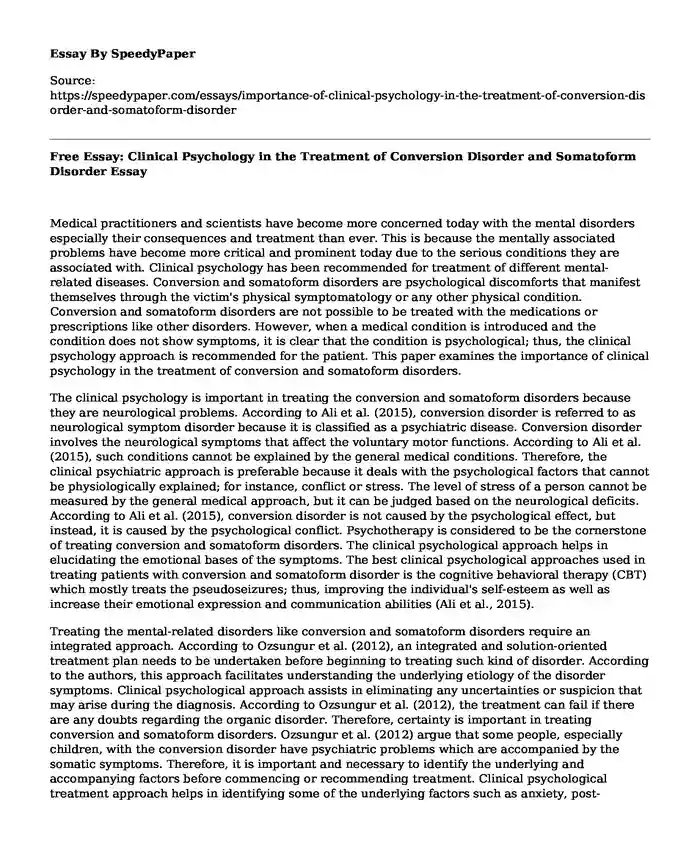
| Type of paper: | Literature review |
| Categories: | Psychology Mental disorder |
| Pages: | 3 |
| Wordcount: | 680 words |
Medical practitioners and scientists have become more concerned today with the mental disorders especially their consequences and treatment than ever. This is because the mentally associated problems have become more critical and prominent today due to the serious conditions they are associated with. Clinical psychology has been recommended for treatment of different mental-related diseases. Conversion and somatoform disorders are psychological discomforts that manifest themselves through the victim's physical symptomatology or any other physical condition. Conversion and somatoform disorders are not possible to be treated with the medications or prescriptions like other disorders. However, when a medical condition is introduced and the condition does not show symptoms, it is clear that the condition is psychological; thus, the clinical psychology approach is recommended for the patient. This paper examines the importance of clinical psychology in the treatment of conversion and somatoform disorders.
The clinical psychology is important in treating the conversion and somatoform disorders because they are neurological problems. According to Ali et al. (2015), conversion disorder is referred to as neurological symptom disorder because it is classified as a psychiatric disease. Conversion disorder involves the neurological symptoms that affect the voluntary motor functions. According to Ali et al. (2015), such conditions cannot be explained by the general medical conditions. Therefore, the clinical psychiatric approach is preferable because it deals with the psychological factors that cannot be physiologically explained; for instance, conflict or stress. The level of stress of a person cannot be measured by the general medical approach, but it can be judged based on the neurological deficits. According to Ali et al. (2015), conversion disorder is not caused by the psychological effect, but instead, it is caused by the psychological conflict. Psychotherapy is considered to be the cornerstone of treating conversion and somatoform disorders. The clinical psychological approach helps in elucidating the emotional bases of the symptoms. The best clinical psychological approaches used in treating patients with conversion and somatoform disorder is the cognitive behavioral therapy (CBT) which mostly treats the pseudoseizures; thus, improving the individual's self-esteem as well as increase their emotional expression and communication abilities (Ali et al., 2015).
Treating the mental-related disorders like conversion and somatoform disorders require an integrated approach. According to Ozsungur et al. (2012), an integrated and solution-oriented treatment plan needs to be undertaken before beginning to treating such kind of disorder. According to the authors, this approach facilitates understanding the underlying etiology of the disorder symptoms. Clinical psychological approach assists in eliminating any uncertainties or suspicion that may arise during the diagnosis. According to Ozsungur et al. (2012), the treatment can fail if there are any doubts regarding the organic disorder. Therefore, certainty is important in treating conversion and somatoform disorders. Ozsungur et al. (2012) argue that some people, especially children, with the conversion disorder have psychiatric problems which are accompanied by the somatic symptoms. Therefore, it is important and necessary to identify the underlying and accompanying factors before commencing or recommending treatment. Clinical psychological treatment approach helps in identifying some of the underlying factors such as anxiety, post-traumatic stress as well as attention-deficit hyperactivity.
In conclusion, even though conversion and somatoform disorders have been less frequently experienced in the recent past years, it is still a critical mental disorder that affects many people especially children in the developing world. Therefore, more research is required in the health sector to determine the alternative treatment approaches or control measures for the conversion and somatoform disorders. However, the clinical psychological approach still remains the cornerstone in the treatment of conversion and somatoform disorders due to its effectiveness and efficiency.
References
Ali, S., Jabeen, S., Pate, R. J., Shahid, M., Chinala, S., Nathani, M., & Shah, R. (2015). Conversion Disorder-Mind versus Body: A Review. Innovations in clinical neuroscience, 12(5-6), 27. Retrieved from https://www.ncbi.nlm.nih.gov/pmc/articles/PMC4479361/
Ozsungur, B., Foto-Ozdemir, D., Ozusta, S., Topcu, M., & Topaloglu, H. (2012). Treatment of a severe conversion disorder in a 10-year-old boy: a case study and overview. The Turkish journal of pediatrics, 54(4), 413. Retrieved from https://www.researchgate.net/publication/236926870_Treatment_of_a_severe_conversion_disorder_in_a_10-year-old_boy_a_case_study_and_overview
Cite this page
Free Essay: Clinical Psychology in the Treatment of Conversion Disorder and Somatoform Disorder. (2022, Apr 12). Retrieved from https://speedypaper.net/essays/importance-of-clinical-psychology-in-the-treatment-of-conversion-disorder-and-somatoform-disorder
Request Removal
If you are the original author of this essay and no longer wish to have it published on the SpeedyPaper website, please click below to request its removal:
- Free Essay Sample with the Turkey Ottoman Empire Research
- Law Essay Sample on Child's Custody Doctrines
- Free Essay about Social Areas That Were Affected by the Advent of Printing
- Essay Example: Marketing Strategy for the Device for Veins Location
- Essay Example on Indigenous Australian Peoples and the Policy of Assimilation
- Public Relations Budgeting, Free Essay for Everyone
- Essay Example on Benefits of Social Media Platform in Healthcare
Popular categories




